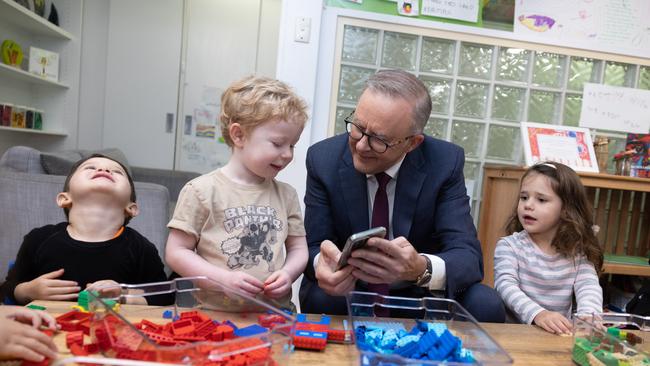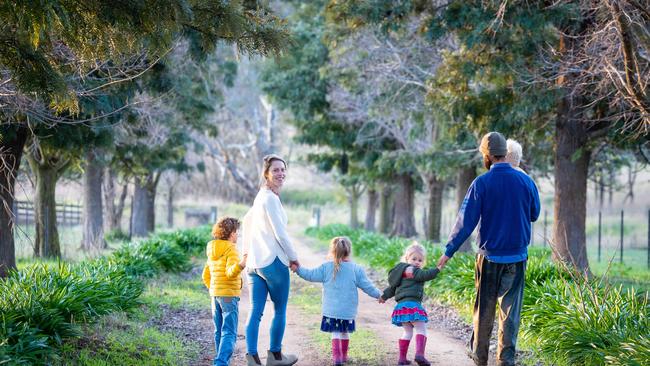Why are parents at the bottom of the list in child care debate?


Fighting for “high-quality and affordable childcare” is a natural response to a situation where parents regularly witness the inability of childcare to meet the needs of their child. We want a solution to the stress and disconnectedness of our lives. We want equality. But we are pinning our hopes on a fundamentally flawed model of care.
I wasn’t in the room at the Albanese government’s Early Years Summit last month. These childcare talkfests never seem to include many parents in full-time caregiving roles such as myself. From media reports I understand a lot was said about “giving kids the best start in life” by increasing the number of early learning educators, increasing their pay, increasing the childcare subsidy, and increasing quality standards.
All these things would certainly improve childcare conditions significantly, but at its core childcare will stay the same: Separation, lost hours with our loved ones and nothing but the veneer of gender equality which leaves women working double shifts and still taking on the majority of unpaid labour.
To my knowledge, this wasn’t mentioned at the summit.
We can change some of the conditions educators are being asked to work in, but we cannot change the fact that the whole point of childcare is to maximise the number of children being cared for by a single adult. Educators are tasked with ensuring the needs of multiple children are met during the most critical and sensitive developmental periods of that child’s life.
We also can’t change the fact that the educator is not the child’s parent and cannot possibly maintain a parent-like investment in their charges. Continuity and consistency of care, the most basic needs of babies and young children under three, seem to be directly at odds with profit-driven group care.
Many of these educators are incredibly knowledgeable and skilled, but with such huge responsibility comes an enormous amount of stress. These are incredibly emotionally and physically demanding roles in working conditions that are far from ideal. Group care, by its very nature, is setting them up to fail.
In the context of a childcare industry clearly buckling under pressure, it is a matter of urgency that government subsidises alternative care models. Our leaders must give families the choice to perform care work themselves. Gearing policy to send more babies and young children into an institution that lacks the infrastructure to cope is a major ethical dilemma of our time.
We could spend billions on the logistic task of training, recruiting and retaining at least 16,000 additional early learning educators by July, as recommended to the senate committee on work and education in October last year. Or we could redirect some of those funds to use a ready-made workforce uniquely adapted to the care of each child: parents.
Subsidising willing and able parents to look after their own kids will reduce the need for ever more childcare spots and quickly ease the pressure on the childcare industry and families alike. Reducing the quantity of care will improve the quality of care childcare centres are able to deliver.

Rather than looking for solutions outside of childcare, politicians and childcare advocates seem to have developed a terrible case of tunnel vision. They maintain a death grip on childcare and view it as a silver bullet, even as women’s paid workforce participation stalls because we are already stretched to our limit. Even as mental health declines and as our kids’ grades fall, politicians keep flogging the dead horse.
If our leaders think childcare is the only way out of this mess, they didn’t really understand the problem in the first place. The devaluation of care work throughout history and unequal distribution of unpaid care work have always been the root cause of gender inequality. It doesn’t matter how much women drive up their paid workforce participation, unless we completely outsource care of babies and children and grow babies in glass wombs, men will maintain the advantage in paid work through minimal participation in unpaid labour.
It could be argued that our total reliance on daycare is actually reinforcing the unequal distribution of care work between men and women. It has enabled men to maintain low participation in unpaid labour. To enter the workplace women shared care work with daycare centres rather than their spouses. Daycare was a means to an end, it was never about the babies and children.
The quickest and most effective way of improving outcomes for our youngest citizens is by invoking policies that increase a child’s access to parental care in their earliest years and policies that work to counteract the insidious devaluation of care. Beyond extending paid parental leave to at least a year we must expand the child care subsidy to include parental models of care for children under the age of three. At the very least, we need tax relief for families with one parent in a caregiving role.
Government needs to signal to families that unpaid care work is a worthy contribution to society. Government needs to demonstrate some semblance of understanding of the fundamental needs of babies, toddlers and young children.
These are measures and strategies we could be arguing for, that have been adopted with great success in other OECD nations.
Finland, Iceland and Denmark have achieved the highest rates of gender equality in the world through generous parental leave and child care subsidy schemes that include child care, parental care and private care arrangements. These are policies that would lead to genuine equality, better learning and developmental outcomes and relieve stress on families, but we can’t hear them because the childcare debates have reached a deafening pitch.
Policies that acknowledge the value of parent care improve the status of care work in the wider community. This would probably be a novel concept to social movements that have long advocated for women to raise their status in society simply by avoiding care work. How about raising the status of care work? Why would men ever do this work if it is something that women are still actively encouraged to avoid?
Government support for caregivers makes the role itself less oppressive and it becomes less of a disadvantage to perform unpaid care work. Financial support for caregivers affords them independence. Caregiver support means single parents don’t have to choose between poverty and putting their children in formal care.
Workplace culture must also shift to be more inclusive of caregivers in general but particularly men in caregiving roles. Without equally redistributing the wage and career progression penalties that come with caregiving, we cannot achieve true, lasting equality. In the same way that women excelled in the paid workforce when given a chance, increased involvement of dads in care work could transform family life. Men are disproportionately missing out and they cannot get this time back.
Childcare policies allow politicians to pose as supporters of women and families while also conveniently maximising the number of worker bees in the paid workforce generating taxes and GDP. The goal of the earlier year of kindergarten and the “high quality affordable daycare” is to have as many possible children under the care of a single adult. For all the lip service about the triple bottom line, our government apparently has no metric for the value of parents investing time in their children, the social and health benefits.
Even the economic rationale of childcare has been called into question. While group care is the cheaper option in the short term due to a high carer to child ratio, the likes of Peter Cook, an Australian family psychiatrist, and Jay Belsky, a researcher with the University of California, have long argued that the consequences of childcare make it more expensive than parent care in the long run.
In his 2011 book, Mothering Matters, Cook cites reams of research to argue that generous parental leave and caregiver support measures would actually cost less than the consequences of parental absence. If childcare looks like a financial saving at the outset but ends up leading to greater expenditure then it starts to resemble a false economy. Are we comfortable throwing billions after a false economy?
You don’t need a degree to see that the combination of childcare and parents performing many hours of paid work can be a chronically stressful arrangement for both parents and children. Leading hardworking families to believe that daycare is the only way to have a family and live in relative financial security is economic coercion. Instead of giving families a choice, government keeps dangling a carrot: if you just work a bit harder things will be better. If women just work a bit more they can be equal and have influence and financial independence.
Childcare also has some seriously slick marketing behind it these days. The buildings often boast fancy finishings, green space and minimal, modern architecture. The advertising is full of green leaves, smiling faces and children playing with advanced and aesthetically pleasing toys. The marketing plays on parents’ insecurities about their capability to give their child the best start.
The blind pursuit of more and better daycare is revealing of attitudes towards unpaid care work and labour. The rationale is clear – we can support you if you’re actually going to work but we won’t support you to sit at home and do nothing. Blow me down with a feather if birthing four future taxpayers and keeping them alive for the last seven years is considered “doing nothing”.
Do our politicians and childcare advocates really believe that parents are interchangeable with educators who are perfect strangers at the outset? Do they really believe that we can simply outsource this time with our kids in these critical years and that our lives will be better for it?
Families deserve better than this. It seems our leaders are seeking to justify their own world view, reassure themselves that the sacrifices they made were necessary and then impose these sacrifices on everyone else to relieve their own insecurities. Expanding childcare isn’t progress, it’s a slow march to a dead end in the search for equality and a second-rate start for our children.
Virginia Tapscott is a director at Parents Work Collective, a not-for-profit organisation raising awareness of the value of care work.






Through the tears at drop-off, separation anxiety, the unrelenting illnesses and the nagging feeling that this wasn’t how it was supposed to be – families with children under five know full well childcare isn’t working.